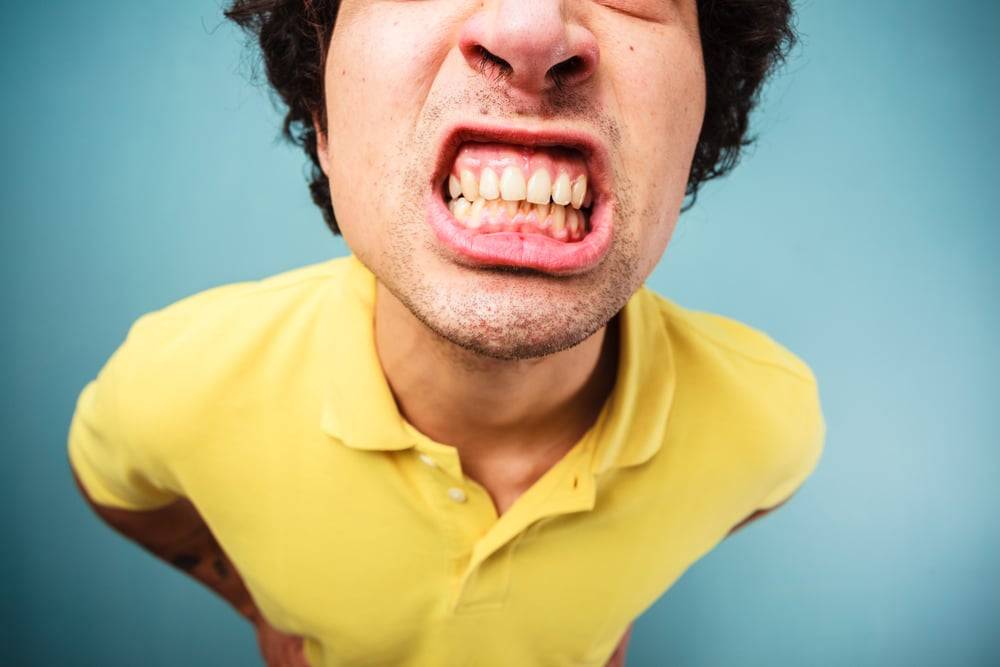
Bruxism is the medical term for excessive jaw clenching or teeth grinding. Grinding teeth in sleep is very common and many people are not aware they are doing it. However, apart from grinding teeth in sleep, people with bruxism also grind their teeth or clench their jaw while concentrating or under stress.
Symptoms
Some of the most prevalent symptoms of teeth grinding include:
- Headaches
- Earache
- Facial pain
- Worn-down teeth (may lead to tooth sensitivity and eventual tooth loss)
- Facial pain
- Disrupted sleep
- Broken fillings or teeth
- Stiffness and pain in the jaw joint as well as the surrounding muscles (may lead to TMD or temporomandibular disorder)
Causes
Teeth grinding causes can vary from one person to another. However, in most cases, the condition is often linked to factors like anxiety, stress, and sleep problems.
Anxiety and Stress
Teeth grinding caused by anxiety and stress often happens in sleep and many people are not aware they are doing it.
Medication
In some cases, teeth grinding can be a side effect of taking certain medications like antidepressants.
Sleep Disorders
Patients who snore or those who have a sleep disorder like obstructive sleep apnea (OSA), are more likely to grind their teeth in their sleep.
People are also more likely to grind their teeth if:
- They mumble or talk while sleeping
- They behave violently (punching or kicking) while asleep
- They have sleep paralysis
- They experience hallucinations
- Lifestyle
Lifestyle factors that may result to teeth grinding include:
- Drinking alcohol
- Using recreational drugs
- Smoking
- Consuming lots of caffeinated drinks like coffee or tea (6 or more cups / daily)
Bruxism in Children
Teeth grinding can also occur in children. The condition often manifests after the baby teeth appears. However, bruxism often disappears after the adult teeth emerges. If the teeth grinding already affects the child’s sleep, seeing a doctor is recommended.
Treatment
Treatment options for bruxism include the use of mouth splints or mouth guards as well as therapy.
Mouth Splints and Mouth Guards
People who grind their teeth in their sleep might benefit from wearing a mouth splint or mouth guard at night. Mouth splints and mouth guards work by creating a physical barrier between the lower and the upper teeth. They are also considered effective at minimising grinding noises during sleep.
Mouth guards are often similar to those used in sports like rugby or boxing. They can be made of plastic or rubber and can be custom-made by the dentist so it fits the mouth.
Treating Anxiety and Stress
If the underlying cause of teeth grinding is anxiety or stress, psychological interventions like cognitive behavioural therapy (CBT) might help.
Also, for teeth grinding that’s caused by stress, relaxing and getting a good night’s sleep are considered beneficial. To help patients relax and sleep better, the following might be recommended before going to sleep:
- Yoga
- Massage
- Reading
- Taking a bath
- Deep breathing
- Listening to music
Treating and Preventing Dental Issues
Regular dental check-ups can help ensure teeth grinding is detected early so it can be treated right away before it causes further damage.
Dental problems like cracked, crooked, misaligned, and missing teeth are usually treated using reconstructive dental treatments like overlays, crowns, and false teeth. Your dentist will recommend the appropriate treatment option for your case.

 Elite Dental Group
Elite Dental Group